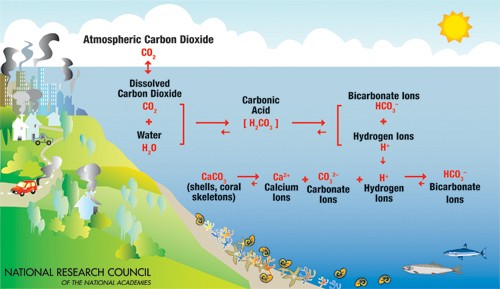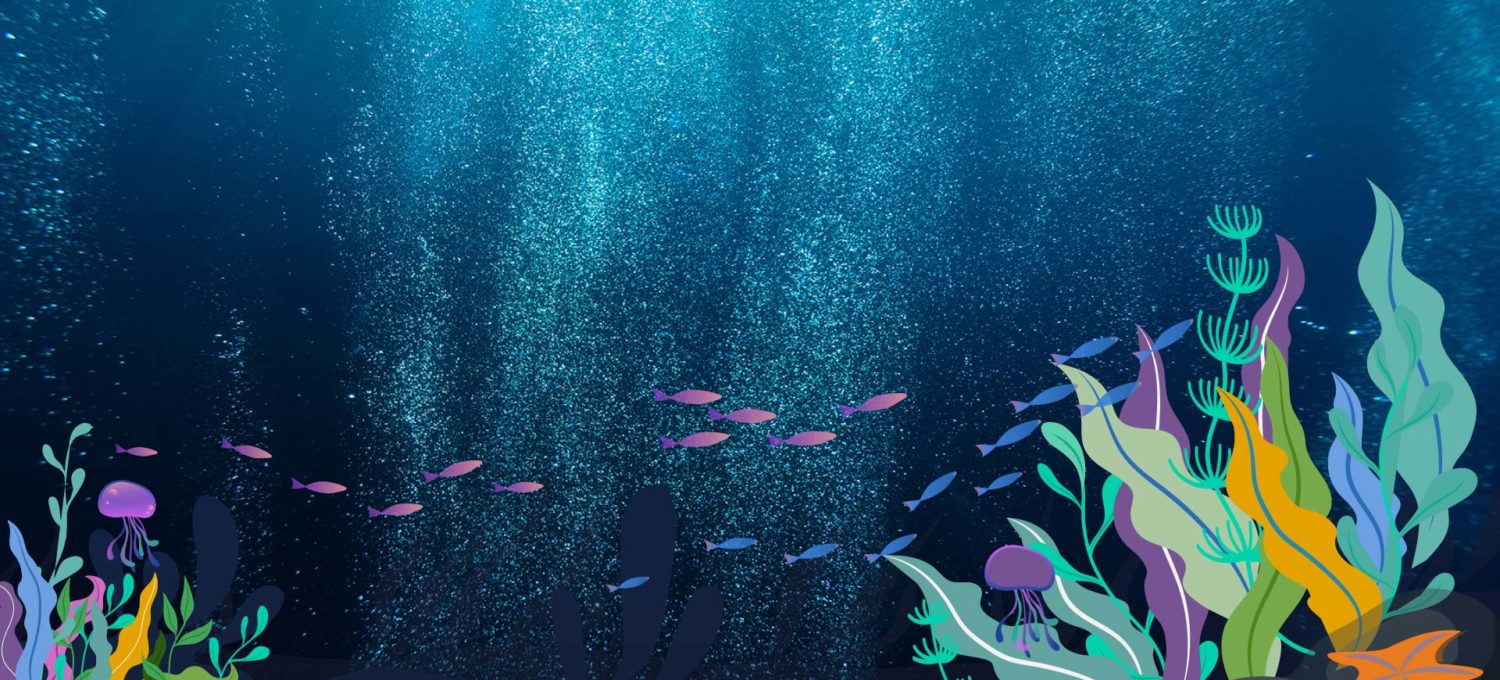Our oceans cover over 71 percent of the Earth’s surface and contain 97 percent of the Earth’s water. They are not only a major part of the earth but are also essential for our survival. Ocean Acidification is easily the biggest environmental threat we face right now.
What is Ocean Acidification?
As we burn more fossil fuel, we release more carbon dioxide into the atmosphere. The oceans absorb carbon dioxide from the atmosphere.
Carbon dioxide reacts with water to produce carbonic acid, which produces hydrogen ions and reduces the pH of water causing the concentration of hydrogen ions to increase drastically.
This increases the acidity of the ocean.

The acidity of the oceans increased by 25% in the past century and it is believed that by 2100 the percentage is expected to rise above 170%. The pH in 1751 was 8.25, in 1996 pH was 8.14 and scientist predict that the pH levels can drop as low as 7.8 by the year 2100.
This rate is alarming and devastating for our oceans and life on earth in general.
Importance of oceans
The oceans produce over half of the world’s oxygen and absorb 50 times more carbon dioxide than our atmosphere.
Over 40% of the world’s population depend on oceans for their primary protein (seafood) intake. A lot of people depend on oceans for their survival. Oceans and oceanic species provide food, medicine, transportation, raw materials and are essential for the regulation of the atmosphere. The oceans also transport heat from the equator to the poles, regulating our climate and weather patterns.
Consequences
Shelled Organisms– Ocean acidification reduces the amount of carbonate, which directly impacts Creatures like oysters, sea urchins, Mussels and many others which rely on it make their shells and skeletons.
As a result of this, these species do not have enough carbonate to make their shells which can lead to their extinction. Some species are also found to be losing their shell volume as a direct result of acidification.
Fish and Mammals – These species will and are directly suffering the consequences of acidification. The water is too acidic for some species of fish to survive. While others are experiencing sensory deprivation and, are having difficulty in finding food or protecting themselves from predators.
Corals– Corals start to bleach (die) with an increase in acidity as their outer skeleton starts to dissolve and decay. Corals are extremely important to us, they not only provide aesthetic value to us, but also act as a barrier and protect us from huge tides and currents. Think of them as a natural wall which shields us from devastating waves and huge tides. Corals protect coastlines from storms and hurricanes.
Impact on Humans
Oxygen– Most of Earth’s oxygen comes from the tiny oceanic plants called Phytoplankton. They are responsible for over 70% of the oxygen on earth (The number has now declined to 40% since 1950). Increasing acidity will lead to the extinction of various plankton species, which could be disastrous for our ecosystem.
Climate Regulation– The capacity of the ocean to absorb CO2 decreases with acidification. More acidic oceans are less useful in moderating climate change. Acidification will reduce the capacity of water to regulate the climate.
Food– Majority of our population (over 3 billion of us) rely on seafood for protein. Ocean acidification can impact food security and stability. Fish alone accounts for about 15.7% of the animal protein consumed globally and there are many other species we consume. Major commercially and economically important marine species will be affected and many people will experience a food shortage.
Jobs – Oceans open a wide variety of job opportunities for us ranging from fishing to designing ships. Many people rely on oceans as their primary source of income. Some rely on fishing, others collect and sell oysters for income. Many species provide medicinal value to us, and it is some people’s job to make medicine out of them. All of these people may lose their jobs in the near future.
Our survival is at stake!
It is easy for us to think that these are problems of the future, but we are experiencing consequences right now. Corals reefs are bleaching and as a result, our coastlines are not protected from huge tides and waves.
Some believe that without corals and some other species chances of hurricanes, tsunamis, and oceanic landslides will increase.
With more than 40% of the world’s population living on the coastline, we all depend on a healthy sea just as much as the beautiful creatures in it.
How can we fix this?
To be honest, this is really difficult to fix. Imagine if all carbon emissions and greenhouse gas emissions stop right at this moment. Even then it would take a lot of time for our oceans to regain their pH balance.
All we can do right now, and the only thing that is truly going to work is to reduce our carbon emissions.
We can persuade our lawmakers to impose strict laws against carbon emissions. Strict laws and regulations will discourage companies from exploiting the environment for their gain.
We can start by spreading awareness about ocean acidification and it’s devastating effects on our lives and the lives of our future generations.
In the end, Earth is our home and we must conserve and preserve our oceans and its biodiversity regardless of the consequences.
Feel free to share this story with your friends and family, and educate them about these issues.
